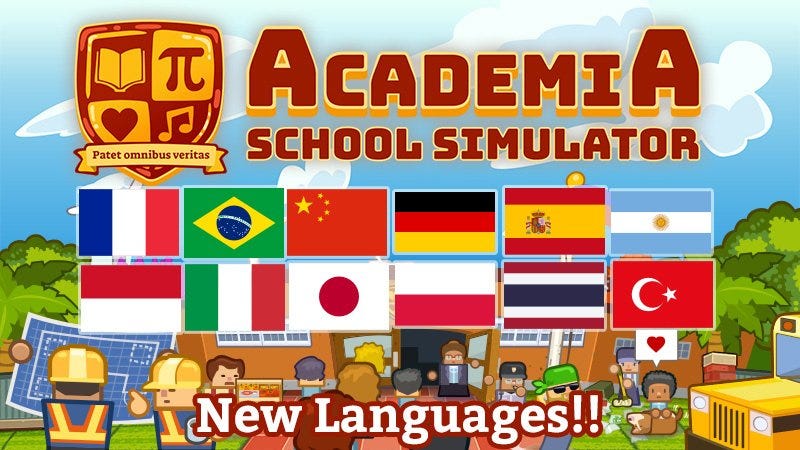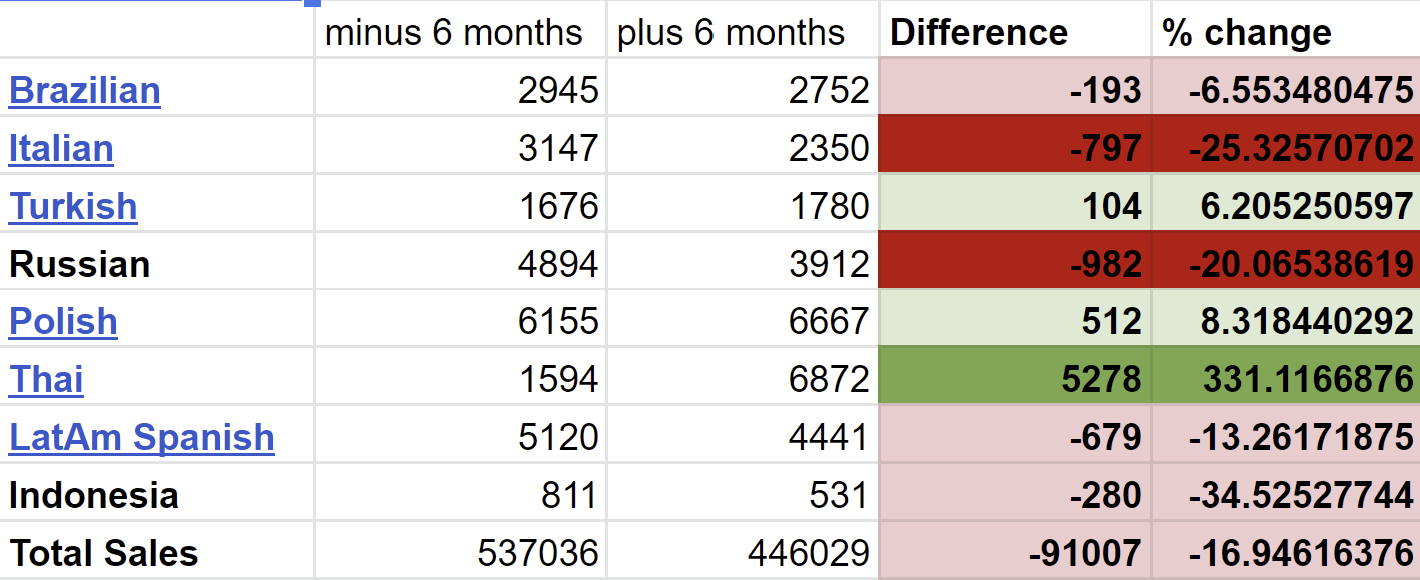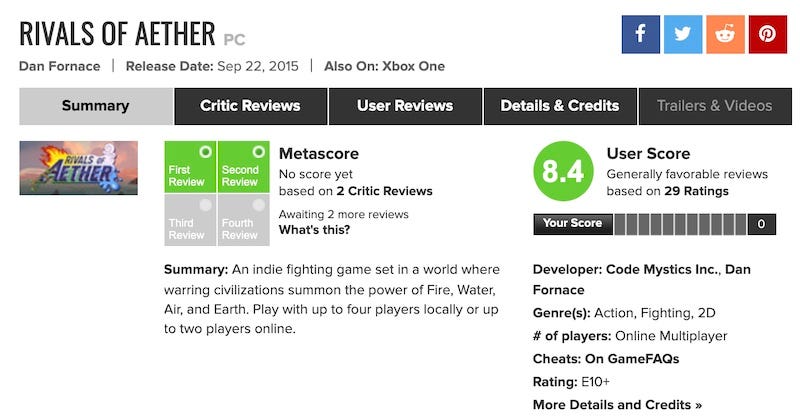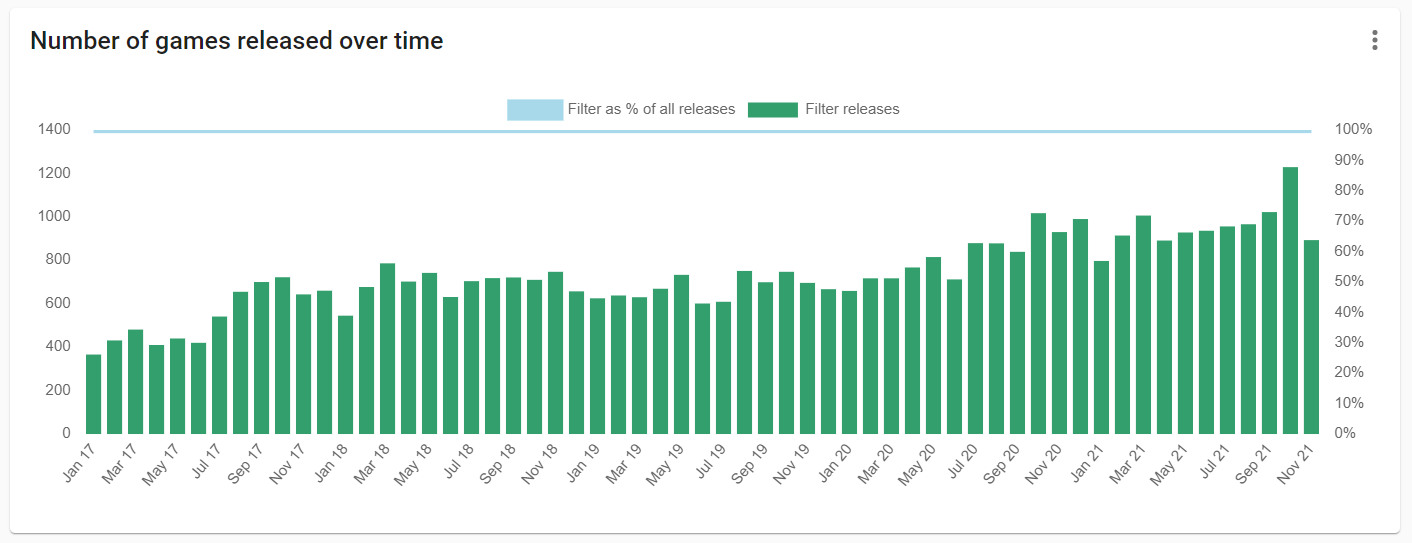Case study: how localization amps up game discovery
Publikováno: 1.12.2021
Languages matter - a lot.
[The GameDiscoverCo game discovery newsletter is written by ‘how people find your game’ expert & GameDiscoverCo founder Simon Carless, and is a regular look at how people discover and buy video games in the 2020s.]
G’day, folks. It’s a bright, shiny Wednesday, and that means it’s time for the second free missive of the week. This time, we’re expanding our thinking on localization. (Please read this recent GameDiscoverCo newsletter on how localization “opens up so many new potential markets for your PC/console games”, if you haven’t.)
In the first part of today’s newsletter, Ryan Sumo, co-founder of Squeaky Wheel, but currently working at Paradox as Product Manager on Stellaris, reveals data on some post-release experimentation on languages for Academia: School Simulator, which we previously ran detailed Steam stats on. Let’s go, Ryan!
[Before we get going: Thursday is the last day in a long while that you can get our newsletter, data, Discord and eBooks tier for 33% off. Here’s some details - including a demo video - on what you get, and here’s where you sign up. Easy as pie, and thanks for supporting us.]
Academia: post-launch localization wins & losses
This piece talks about options for localization and what Squeaky Wheel did for Academia: School Simulator. We share real data from our game to help inform your own decisions.
Why localization? The U.S., EU, and U.K. are traditionally known as the largest market for Steam players. However, Steam is expanding its reach around the globe - and more and more players from different countries expect their games to be localized. Steam’s access to a global market is one of the best advantages it has to offer to the indie developer, and you should take full advantage of it.
And localization is not free. So how do you decide which languages offer you the best value for money?
Gut feel & common knowledge
You can definitely use this. For example, it is fairly common knowledge that China and Russia are large, untapped markets for PC gaming, so it makes sense to localize for them. Germany is well known for liking simulation games. France and Italy are relatively large populations, wealthy countries which may have lots of gamers.
Japan is not well known as a PC market, but its population does not speak a lot of English, so it’s required to localize before you can make money there (same for Korea, Turkey, Thailand). Some are risky bets like Thailand or Vietnam where they don’t speak English (which is good), but you don’t know what the PC market there is like or if there is demand for PC games (which is bad).
Analyzing wishlist data
In Steam’s back end, you can check the regional sales data - and by clicking on the plus sign next to a country you can see the wishlist data. Although it’s not 100% a sure thing, we assume that someone from that country who has wishlisted the game will be more inclined to buy the game if it is localized.
You then list the number of wishlists per country, as we did for Academia - please note we already had Japanese, Chinese, German and Spanish localizations for the game at this point. We then use gut feel and common knowledge as a lens to analyze the data, choose which languages are most likely to be good value for money. Lastly, you can also make the decision depending on the cost of localization. Obviously the lower the cost, the better the value for money.
I’ll walk you through my thought process on some of the countries so you get an idea of what I was thinking, but please take note you will have to do this yourself if and when you decide to do localization. There’s strong demand from the Netherlands, but its common knowledge that most folks there speak good English, so a localization may not be absolutely necessary. Italy is traditionally a “must translate”, but the demand seemed weaker.
Thailand is a very interesting choice. We had a pretty big Thai streamer cover our game one time, and I always regretted not having it localized then. I also met a Thai journalist at Tokyo Game Show who was a fan of our game. And given that English proficiency in Thailand is relatively low, it may be a good bet to localize in Thai.
[Here, we’ve removed two whole sections - for space reasons - that were very useful for indies about a) possible choice of localization tools and b) the process of finding localizers. You can find these both on Squeaky Wheel’s version of the article - start at ‘Pick a Localization Tool’.]
Post-launch localisation: what was the result?
We announced the release of our localization update on March 30th, 2021. I’d been waiting for quite some time to see what the results of our localization experiment with Academia were. Short term numbers aren’t very useful with these things.
So when half a year had finally passed I took a look at the numbers, and compared the 6 months before and after March 30th (and also did comparisons for 1 month and 3 months, to track differences).
Of course, we know this comparison is skewed in many ways. First of all, since we haven’t been doing regular updates to Academia, sales will degrade over time. Total sales revenue (above in USD) declined 17% when comparing the two periods. The previous 6 months before the localization release also include the Early Access => 1.0 launch of the game, which means those numbers will naturally be much higher.
Lastly, some of these languages such as Russian already had unofficial Steam Workshop translation mods before we released our official localization. So for those languages specifically, it will be more difficult to compare ROI - since many players probably already picked up the game and installed the mod while the game was still “fresh”.
So how did our languages do? Here is a copy of the spreadsheet where I did my calculations. And remember, the baseline to compare against is -17%:
Brazil: this saw -6% in revenue 6 months after localization. When I look at the 1 and 3 month comparisons, the gap is narrowing. So it may be that the Brazilian localization will be worthwhile in the long run.
Italian: I was also very disappointed by Italian, which showed -25% when compared to the previous 6 months.
Turkish: I was bullish on Turkish, but it only showed modest growth at 8% more compared to the previous 6 months. Interestingly, there was a bit of a boost at month 3, when there was 30% gain compared to the previous 3 months.
Russian: shows a similar decline in sales comparative to the 6 months previous to the announcement. But similar to Brazil, the gap is narrowing. At month 1 there was a -61% difference, month 3 -30%, and by month 6 the difference was -20%. I suspect within a year, the gap will have closed.
Polish: similar to Turkish, Polish posted a small 8% gain compared to the 6 months previous.
Thai: Of all the languages we had localized, Thai is the outlier here, posting a 331% increase when comparing the 6 months previous to localization release vs 6 months after. At month 3, similar to Turkey, it experienced a small boost (possibly due to the Summer Sale?) where it showed an increase of 424% compared to the 3 years previous. [SIMON’S NOTE: this is the second mention of Thai localization being positive recently, after Let’s Build A Zoo also did well with it.]
LatAm Spanish: is a little harder to track, since it encompasses so many countries. So I only did the 6 month comparison, where it shows -13% when compared to the 6 months previous.
Indonesia: I initially had high expectations for Indonesia - before I realized that the Steam Store page does not list Bahasa Indonesia as a language. This is a really big deal, since part of my localization thesis is that the Steam algorithm will prioritize showing content to users based on their selected language. Since Bahasa Indonesia is not a selectable language in Steam, Indonesian players likely won’t even know that we added their language to the game. Unsurprisingly, it showed a -34% difference when compared to the previous 6 months.
Conclusion: which languages definitively returned?
Within 6 months, only the Thai localization can reasonably be said to have paid for its localization costs. Turkish and Polish are on track to do that within a year of the localization release.
Localization is definitely a long-term game. Ideally, you should have your localization all ready and done before your game launches - to take advantage of how Steam increases your visibility at launch. As with most things, when it comes to success in games, localization isn’t a sure thing.
But with some careful choices, you can improve your game’s revenue stream over the long haul. There are many different things to take into consideration. And I hope that this article helps other indie developers get a better idea of how to approach localization for their own games.
[Thanks to Ryan for this great data! Also wanted to mention again Chris @ Fellow Traveller’s recommendations for best ‘bang for your buck’ languages across PC and Switch: “Simplified Chinese; Japanese, if it's also on Switch (opens up the Japanese market.); Traditional Chinese, if it's also on Switch (opens up the Taiwan/Hong Kong store.); Russian; Brazilian Portuguese.”]
Metacritic: a meta-discussion of its current utility?

Robot Teddy’s Callum Underwood made the above Tweet a few days ago, apparently on behalf of Clone Drone In The Danger Zone, which he is repping nowadays. And a) I agree it’s pretty weird, and b) let’s get into what is happening here, shall we?
The way I see it, the Internet consists of a series of tubes a series of interconnected, but separate filter bubbles. It’s not very obvious sometimes that you’re in a filter bubble, because… well, you’re inside the darn thing. The bubbles occurring here are:
Those who play games and pay attention to Metacritic: core gamers who want to know whether to buy $60 games; devs, publishers, console platforms and those who want bonuses from publishers; people who read Day 1 reviews.
Those who play games and pay no attention to Metacritic: players of evolving, sometimes GaaS titles with user-generated content and lots of YouTube videos - especially on PC; developers of those games; people who think scoring evolving games is a fool’s errand.
The former group have had additional complaints about Metacritic - particularly its lack of transparency into ‘review weighting by outlet’. This led in part to the formation of OpenCritic. But heck, OpenCritic doesn’t even have Clone Drone In The Danger Zone in its database at all! (So the weighting thing is a different problem.)
So there’s a couple of things going on here. Firstly, reviewing and scoring these new, sometimes sandbox-y/evolving PC titles on launch is a bad fit for those few smaller semi-professional outlets still scoring games. And secondly, many major outlets such as RockPaperShotgun, Eurogamer and Kotaku review games, but don’t assign scores.
So you end up with a hodge-podge of enthusiast sites making up your Metacritic numbers, unless you’re in the ‘get reviewed by IGN and GamesRadar’ pile. There’s still games that decidedly hit that pile - I was surprised to note that Sable has 45 reviews in total, for example.
But many, many top-selling games - especially sandbox-y, GaaS-y or ‘looser’ ones, which are ironically often the type of games that can do great nowadays - just don’t get reviewed by that crowd. Look at the replies - Totally Accurate Battle Simulator has 1 Metacritic review, Supraland has 4, Rivals Of Aether (above) has 2. It’s practically a badge of honor for certain types of top-selling game at this point!
As for whether Metacritic negatively affects your biz if you don’t have 4 reviews? Some console or AAA game veterans do not take games seriously - or believe they have actually sold well - if they don’t have a Metacritic score. Even now. And select console platforms factor Metacritic performance into promotional eligibility, too? So within certain filter bubbles, it genuinely does matter.
So I’m not sure what the solution is here. It’s not ‘make more niche press sites who care about boxed-style games review GaaS titles with a score’, that’s for sure. Maybe it’s ‘create alternative currency for game success through a different type of quality index’. Or maybe it’s just ‘everyone needs to understand that Metacritic can be a very poor reflector of game popularity or enjoyment in 2021’. There, I just helped you all with that one.
The game discovery news round-up..
And as we round out this newsletter, we must take to the links of death. Beware the links of death, my son, the jaws that bite, the claws that catch! No? Fine, here’s some useful information for you:
Valve has updated the Steam Deck FAQs (and added localized/captioned versions of the recent Steam Deck talks). And in perusing the FAQ you may see gems like this on suspend/resume: “The primary consideration is that Steam Deck will disconnect from Wi-Fi while suspended, so we recommend that you back up your save files before suspending. We plan on providing some APIs to help with that.”
The end of year ‘best games of 2021’ deluge is almost upon us, with Paste’s Top 30 games of the year the first of many we’ll try to recap in here. Some obvious stuff in here - Psychonauts 2, Metroid Dread - but some less obvious neatness like Unsighted & Olija that these lists often expose. Explore it at your leisure…
Microlinks, Pt.1: HypeHype is a mobile ‘make your own games’ app, and maybe a way players could make hypercasual hits?; this new GWI report (summary via the GameDev Reports Substack) has fun ‘big picture’ infographics; some sales numbers from the Steam game Signals - 1060 launch wishlists, 382 W1 sales.
It’s The Game Awards next week, of course, and Twitch is doing a themed ‘Winter Gathering’ live stream around it, with showcases from The MIX, #FutureOfPlay, id@Xbox, Devolver public access (lol), Saber Interactive and more. Maybe this is a new winter ‘nexus’ for streaming events?
Steam’s top releases of October are here, “highlighting the Top 20 games and Top 5 DLC releases based on the first two weeks of revenue. We also highlight the top 5 free-to-play games, ranked by the number of unique players they acquired after launch.” As always, interesting to see what’s in there vs. GameDiscoverCo Plus estimates.
Microlinks, Pt. 2: Google Play’s Best Of 2021 includes a large amount of Android video game lists, from barely grossing indies to F2P giants; Peloton is adding video game-like experiences too, exercise fans; how Supercell’s Brawl Stars hopped on on the MrBeast x Squid Game bandwagon, funding & download wise.
Tumblr has released its year in review, including its top video game tags/communities and top mobile game tags/communities. Obviously another filter bubble, but some really interesting stuff - Genshin Impact being top, Deltarune so high, but also Omori & Friday Night Funkin’ charting, etc. (Found via Ryan Broderick’s excellent Garbage Day newsletter.)
Artur Karpinski, dev of Jupiter Moons and a regular GameDiscoverCo Plus Discord denizen, has a good Reddit thread on amassing 15,000 Steam wishlists via Steam events: “If a game showcase has a Steam sales page that will get a feature on Steam front page, it's by far the most efficient way to promote your games. Even if this event is [a] paid one like Gamescom or PAX.” Usual caveats about wishlist quality apply, but it still gud idea…
Finally, everyone loves a good chart, and VGInsights is happy to oblige with this recent Twitter post on Steam releases by month (November incomplete):
As they note, that’s “1,229 new games released on Steam in October 2021… that's 64% more than the 747 in October 2019.” But let’s keep reaching for those stars! See you on Friday, Plus subscribers, or next Monday, free crew, and thanks for reading…
[We’re GameDiscoverCo, a new agency based around one simple issue: how do players find, buy and enjoy your premium PC or console game? We run the newsletter you’re reading, and provide consulting services for publishers, funds, and other smart game industry folks.]




